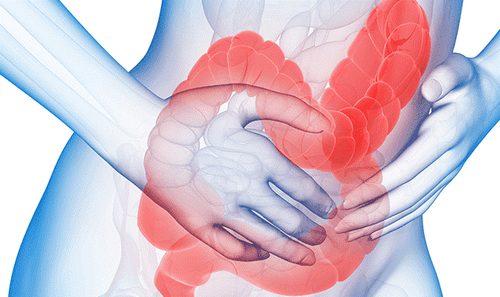This is an automatically translated article.
The article is professionally consulted by Master, Doctor Vu Huy Binh - Department of Medical Examination & Internal Medicine - Vinmec Hai Phong International General Hospital.Irritable bowel syndrome is a common digestive disorder, with common manifestations of abdominal pain and bowel disorders, if not carefully and fully examined, irritable bowel syndrome may be misdiagnosed with other diseases. other gastrointestinal disorders such as enteritis, colitis....
1. What is irritable bowel syndrome?
Irritable bowel syndrome is a functional gastrointestinal syndrome characterized by abdominal pain and altered bowel habits. Or showing symptoms in the colon, this syndrome is also known by many different terms such as spastic colon, nervous colon, and irritable colon.Irritable bowel syndrome is a chronic condition, causing patients to often face digestive disorders, greatly affecting the patient's psychology and quality of life.
2. Characteristic manifestations of irritable bowel syndrome
The most important features of irritable bowel syndrome are: The manifestations of chronic or recurrent gastrointestinal disorders and the absence of physical damage to the gastrointestinal system, this is a very important feature to distinguish distinguish irritable bowel syndrome from other gastrointestinal disorders with similar presentation.2.1 Pathophysiological basis of irritable bowel syndrome
So far, although the exact cause of irritable bowel syndrome has not been determined exactly, there are many factors that have been shown to be related to this syndrome such as: Diet, stimulants , psychological factors...An overview of the pathogenesis of irritable bowel syndrome includes a combination of the following three factors:
Changes in bowel motility or, more broadly, the response to peristalsis Incompatible smooth muscles of the colon and small intestine with normal digestive activity and with stimuli, this also affects the activity of other smooth muscles such as the urinary tract causing manifestations such as urination. peeing, peeing...

2.1 Who is prone to irritable bowel syndrome?
Irritable bowel syndrome is more common in women than men, women are 2-3 times more likely to have irritable bowel syndrome than men The age of irritable bowel syndrome is usually quite young, mainly in middle age Most patients have symptoms of irritable bowel syndrome before the age of 352.3 Characteristic clinical and laboratory manifestations of irritable bowel syndrome
Two typical clinical manifestations of irritable bowel syndrome are abdominal pain and change in bowel habitsAbdominal pain: As analyzed above, abdominal pain in irritable bowel syndrome often has the following characteristic features:
Diffuse pain, no specific pain point, usually pain in the left lower abdomen, the location of the colon, pain usually starts after eating and usually gets better after the patient is able to defecate.
Chronic abdominal pain, often a dull ache, may be acute pain
Change in bowel habits Changes here include
Change in frequency of bowel movements: less in the form of constipation or increase in diarrhea Change in stool form and nature: Stools become more solid when constipated or looser when urinating, possibly mucus Symptoms of irritable bowel syndrome may present with constipation or diarrhea, a combination of constipation and diarrhea, or alternating episodes of constipation and diarrhea.

Please dial HOTLINE for more information or register for an appointment HERE. Download MyVinmec app to make appointments faster and to manage your bookings easily.














